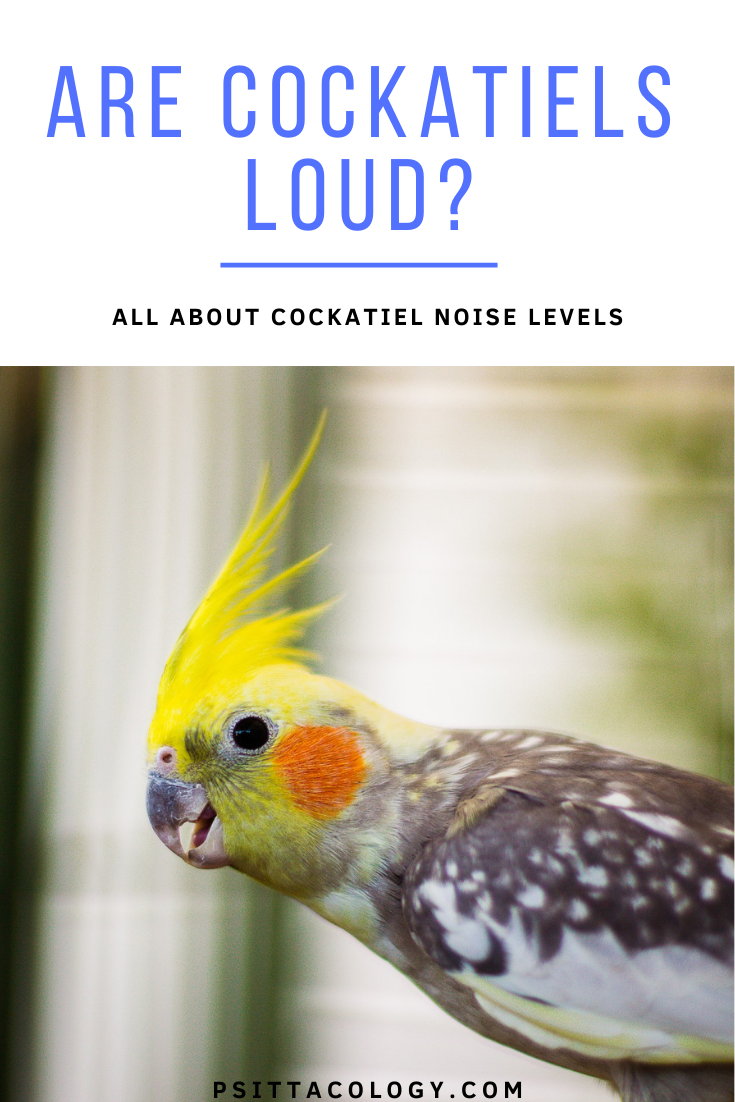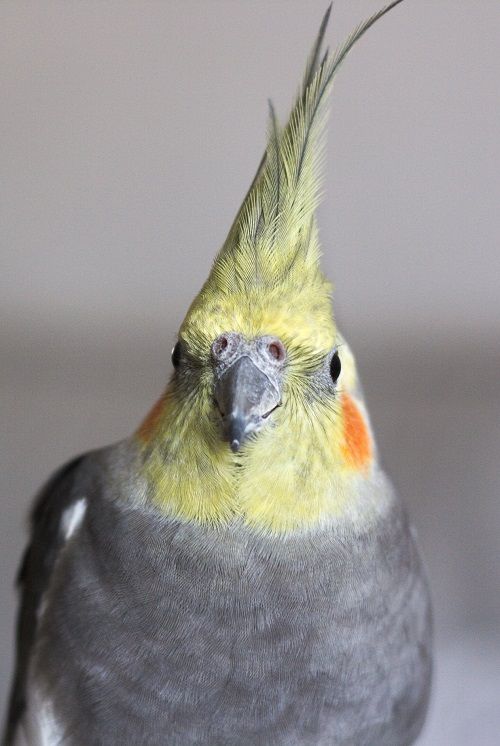Thinking about adding a cockatiel to your family? It’s important to keep in mind that parrots are not the quietest pets. Are cockatiels loud? Can you keep them in an apartment? Will you ever have a moment of peace again?
Let’s go into cockatiel noise levels to help you figure out whether these Australian parrots make an appropriate pet for you, as well as what to do if your cockatiel is screaming non-stop.
Are cockatiels loud?
For a parrot? No. For a pet in general? Yes.
Basically, it all depends on your definition of “loud”. Are they loud compared to an Amazon parrot? No, compared to some of the larger parrot species, they might as well be mute. Are they loud compared to a goldfish? Well, yeah.
All parrots make noise. After all, most species are very social and can occur in large flocks in the wild. Cockatiels are no different, sometimes traveling in groups of dozens or hundreds of individuals. And how do you stay in contact with someone three trees over? That’s right, you yell.
Cockatiels make a variety of sounds. Probably the most bothersome sound to us humans is their contact call, which really is quite loud and shrill. In fact, they can get up to 80 decibels with these contact calls, right at the edge of what is harmful to the human hearing.
If you’ve ever had a cockatiel on your shoulder decide to burst into screams, you’ll know it can definitely cause some ringing in your ears! The upside is that unless your cockatiel is lonely or upset, these contact calls are by no means non-stop.
All in all, cockatiel noise levels will be acceptable for most people. They should also be fine in apartments unless you have really sensitive neighbors.
Below, we’ll have a closer look at what you can expect in terms of noise, including some audio clips.
Did you know? As discussed in the article on cockatiels vs cockatoos, a cockatiel is a small species of cockatoo. Luckily, cockatiels are not nearly as loud as their larger cousins, which are by far the most noisy parrots to be kept as pets!

Males vs. females
As with some other parrot species, like budgies, there tend to be significant differences in noise levels between male and female cockatiels.
Male cockatiels use song to attract mates and maintain social bonds. They’re much more likely to spend much of the day singing, tweeting, and chirping. Females, on the other hand, tend to stick to just flock calls. There are exceptions, but if you’re worried about noise, a female cockatiel tends to be a better bet.
Keep in mind that because female cockatiels don’t tend to be as musically inclined, they also don’t tend to pick up speech or tunes nearly as well as males. If you’re interested in cockatiel talking and teaching your ‘tiel to imitate your voice, a male might be a good choice.
Tip: I can’t stress enough that getting a female cockatiel is not a guarantee that you’ll end up with a quiet bird. A happy and healthy female ‘tiel should usually not be too loud, but keep in mind that birds are just not noise free! A pair of good earplugs are any parrot owner’s best friend.
Are cockatiels loud at night?
One good thing about birds and their noise levels is that you don’t have to be worried about nightly noise. As soon as the lights go off, most cockatiels and other birds go straight to sleep within the span of a few minutes. You might hear the occasional quiet sleepy mutter, but not much else.
If your cockatiel is loud at night, there might be something going on. Something could be scaring your bird; they’re prey animals and pretty easily startled. It could help to cover the cage or, alternatively, your cockatiel might like a night light. Even some ambient sounds can help ensure good sleep.
When are cockatiels loud?
As we’ve discussed, cockatiels can definitely produce some pretty loud screams. The thing is, though, that they generally don’t. This is why they’re classified as one of the quieter parrot species.
As with other parrots, cockatiel noise levels vary throughout the day. A single ‘tiel or a duo will actually likely be quiet for much of the day, peacefully sleeping, playing with their toys, or foraging. The noise peaks around dawn and dusk.
Higher levels of noise might also occur if/when:
- Your cockatiel is bored, lonely, or hungry.
- Your cockatiel hears sounds in the house. Whether it’s a dinner party, the vacuum, or some music, they just can’t help but get involved.
- Your cockatiel is away from its flock mates, sometimes even if they’re just on other sides of the room. Flock mates include humans.
- Your cockatiel hears another ‘tiel, such as a neighbor’s bird.
- Your cockatiel is feeling frisky for a mate, a toy, or even its own reflection. Expect singing, whistling, cooing, and even beak tapping.
- Your cockatiel is startled, sometimes by nothing in particular.
- Your cockatiel just feels like it. Seriously, even long-time parrot keepers can’t always figure out why the heck their birds are screaming!
- The more cockatiels you have, the higher the noise levels will be. Social interactions, flirting and squabbling are non-stop and go hand-in-hand with whistles and screams.
Did you know? Cockatiels form solid partner bonds. According to research, they respond particularly strongly to distress calls from their bonded partners. Noise is just an extremely important part of their social structures and safety.
Liévin-Bazin et al., 2018

Help, my cockatiel is loud!
It can be absolutely exasperating if your cockatiel is vocalizing a lot, especially if we’re talking about those piercing contact calls.
As discussed earlier, unless you keep a larger flock, cockatiels will be quiet for a good part of the day. If yours is not, something may be wrong. Be sure to investigate to ensure your bird is happy and healthy.
Some things to consider are:
- Is your cockatiel lonely? They’re extremely social beings. A lonely cockatiel might scream incessantly whenever you leave the room or don’t pay enough attention to it. You might need to consider a friend for your bird.
- Is your cockatiel bored? A bored bird will absolutely start producing noise to distract itself. Keep your cockatiel wherever the action is, offer lots of attention and be sure to provide plenty of parrot toys.
- Is your cockatiel scared? A skittish cockatiel might be startled by things that seem mundane to us humans. Covering part of the cage might help, and be sure to investigate to see if you can encounter the cause.
- Is your cockatiel getting enough sleep? 12-14 hours of uninterrupted sleep are important. You could try covering the cage to keep all light out.
- Is your cockatiel traumatized? Rescue cockatiels can vocalize excessively and it can be difficult to figure out why, since you don’t always know where the bird came from. Be patient and spend lots of time training and socializing.
If this doesn’t settle it, you could take a deeper dive and have a look at the article on what cockatiels hate to help you figure out what’s going on.
Interesting scientific tidbit: A correlation has been shown between vitamin A overdose and excessive vocalization in cockatiels. Because not much is known about their actual vitamin A requirements, many parrot foods contain a lot of the stuff, possibly enough to overdose. More research is needed, but if your cockatiel is screaming its head off and nothing else works, you could always try switching pellet brands.
Koutsos, Woods & Klasing, 2003.
Quieter parrots
Still worried about noise levels? Although cockatiels are considered one of the quietest parrot species, there are some birds that produce even less noise. Have a look at the article on quiet pet birds!
Do remember that all parrots make noise. It’s a good idea to watch some YouTube videos or visit a local breeder’s facilities to have a listen and see if you can handle it.
Frequently asked questions
It misses you! Cockatiels like being around their flock, so your bird is trying to make contact with you to figure out where you’ve gone. If it’s incessant, it might be a sign your parrot is lonely.
Well, you don’t, really. You should make sure that all of your cockatiel’s social and physical needs are met, but remember that even then, you can expect some screaming in the mornings and evenings in particular.
Absolutely not. Conures, particularly those of the genus Aratinga, are a lot worse than cockatiels in terms of noise levels.
If you have any more questions about cockatiel noise levels or want to share your own experiences with these spunky Australian natives, don’t hesitate to leave a comment below!
Sources & further reading
Koutsos, E. A., Tell, L. A., Woods, L. W., & Klasing, K. C. (2003). Adult cockatiels (Nymphicus hollandicus) at maintenance are more sensitive to diets containing excess vitamin A than to vitamin A–deficient diets. The Journal of nutrition, 133(6), 1898-1902.
Liévin-Bazin, A., Pineaux, M., Clerc, O., Gahr, M., von Bayern, A. M., & Bovet, D. (2018). Emotional responses to conspecific distress calls are modulated by affiliation in cockatiels (Nymphicus hollandicus). PloS one, 13(10), e0205314.


I would like to have one .I think before die I want one , that’s m dram .
Also I love birds.